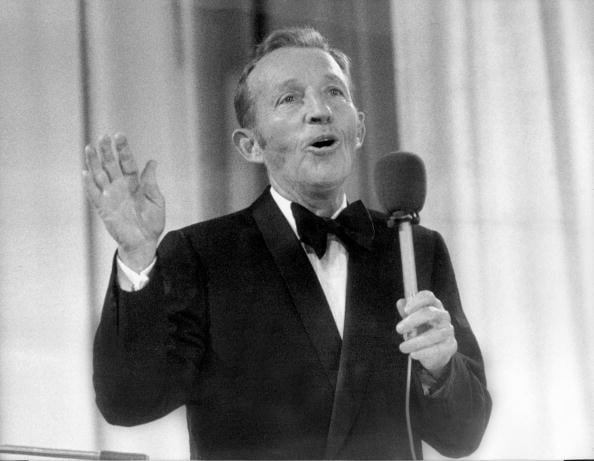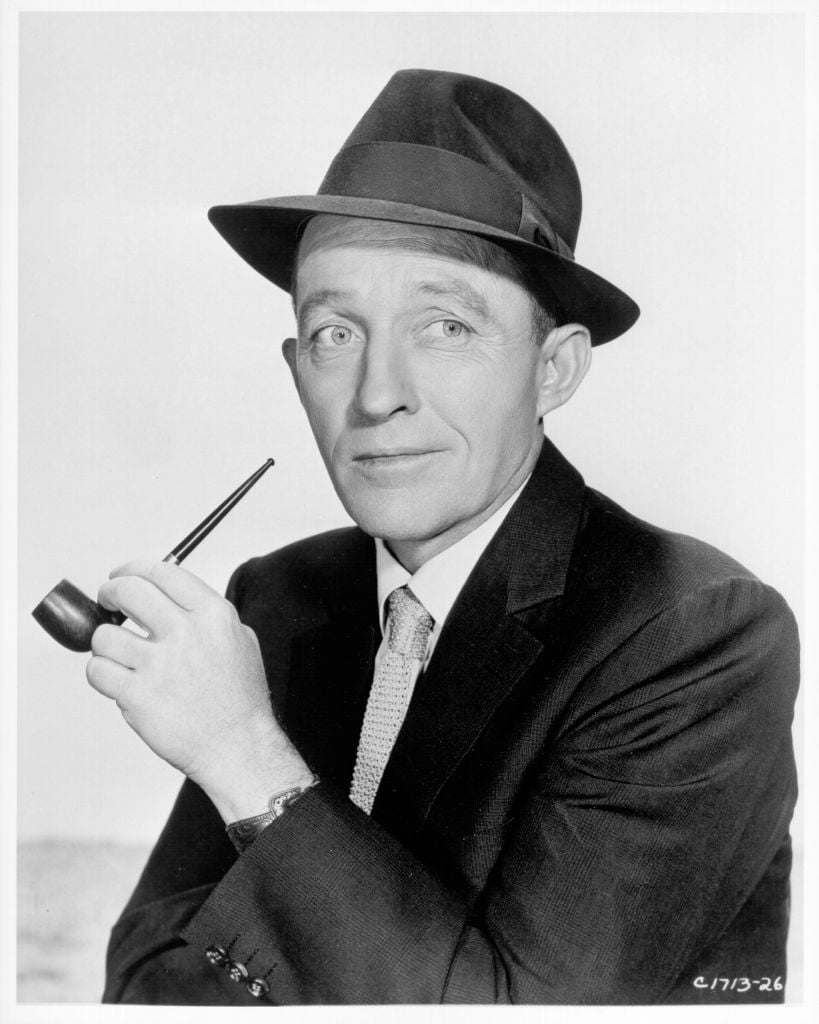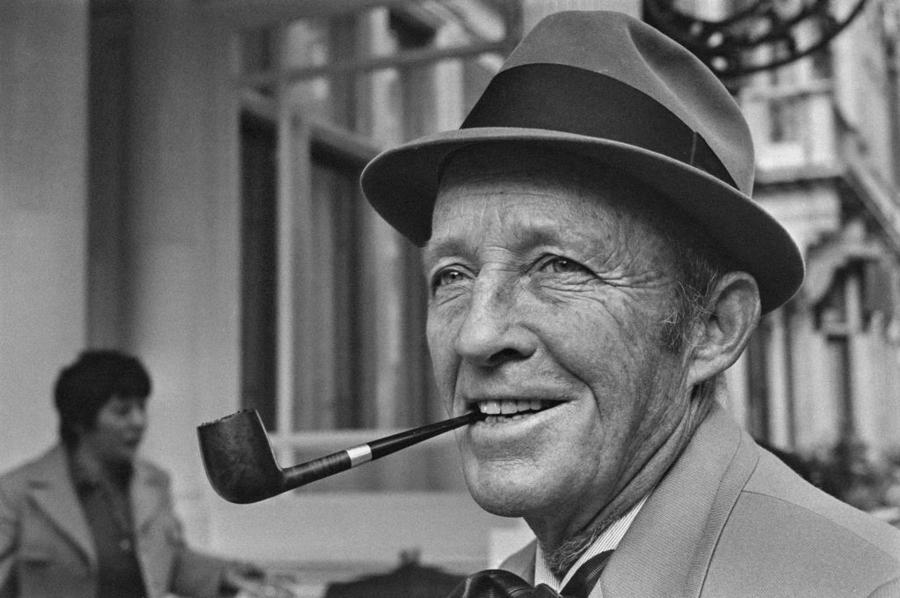What was Bing Crosby's net worth?
Bing Crosby was an American singer, comedian, and actor who had a net worth of $10 million at the time of his death in 1977. That's the same as $50 million today after adjusting for inflation.
Bing Crosby emerged as one of the most influential entertainers of the 20th century, dominating multiple entertainment mediums during a career that spanned over five decades. Born Harry Lillis Crosby in 1903, he first gained attention as a vocalist with the Paul Whiteman Orchestra and the Rhythm Boys in the late 1920s before launching his solo career in the early 1930s.
Crosby revolutionized popular singing with his relaxed, conversational baritone that utilized the microphone as an instrument rather than merely an amplification tool. This intimate approach, known as "crooning," transformed popular music and influenced generations of vocalists. His commercial success was unprecedented—he recorded over 1,600 songs and sold more than half a billion records worldwide, making him the best-selling recording artist of the pre-rock era.
In Hollywood, Crosby became equally successful, starring in more than 70 feature films. His "Road" pictures with Bob Hope and Dorothy Lamour combined comedy, music, and adventure to create a beloved film series. Crosby's performance in "Going My Way" (1944) earned him an Academy Award for Best Actor, and he received another nomination for "The Bells of St. Mary's" (1945).
His rendition of "White Christmas" became the best-selling single of all time until the 1990s, while his annual Christmas television specials became a holiday tradition for American families. As a businessman, Crosby demonstrated remarkable foresight, investing in technological innovations including magnetic tape recording, which revolutionized the broadcast industry. He also became a pioneering sports entrepreneur as part-owner of the Pittsburgh Pirates baseball team.
Radio further extended Crosby's influence, with his variety show "Kraft Music Hall" remaining one of the medium's most popular programs throughout the 1930s and 1940s. His warm persona, versatile talent, and innovative approach to entertainment established Crosby as a cultural institution whose impact still resonates through American popular culture. Despite personal controversies that emerged after his death in 1977, Crosby's artistic legacy as a multimedia pioneer remains undiminished.
White Christmas Royalties
Bing starred in the 1954 Christmas movie "White Christmas". The movie's title song would become one of the most-played songs in recording history. Crosby's version is one of the bestselling songs in history, with over 100 million copies sold worldwide. The songwriter Irving Berlin earned approximately $65 million from that one song alone. Crosby and his heirs have earned tens of millions for a track that was named the bestselling single of all time by the Guinness Book of World Records.
Early Life
Bing Crosby was born Harry Lillis Crosby on May 3, 1903, in Tacoma, Washington. His family soon moved to Spokane, Washington.
In 1917, Crosby took a summer job as a property boy for Spokane's "Auditorium." It was here where Crosby was exposed to some of the finest acts of his day, including Al Jolson, a performer who held a young Crosby spellbound with his adlibs and off-the-cuff parodies of certain Hawaiian songs. Crosby would later describe Jolson's delivery in one word, "electric." Crosby graduated from Gonzaga High School in 1920 and subsequently enrolled at nearby Gonzaga University. He only attended Gonzaga for three years. The university would end up granting Crosby an honorary doctorate in 1937. Today, Gonzaga University has a large selection of Crosby memorabilia, including photographs, correspondence, and other materials.

Getty Images
Showbiz Career
Since Crosby's early career progressed during the era of technical recording innovations, it had a consequential impact on him to have a laid-back singing style. His singing style would influence many artists later in life.
He also had a tremendous impact on the development of the postwar recording industry. At that time, he was working for NBC and hence wanted to record his shows despite the fact that broadcast networks would not permit recording. The problem was generated because the recording at the time lacked quality and was not on par with live broadcast sound quality.
Crosby would join ABC after leaving NBC since he found NBC uninterested in recording at the time. ABC was more interested in his new ideas. Hence, he pre-recorded his radio shows and mastered commercials onto magnetic tape for the first time in history.
For his role in the 1944 movie "Going My Way," he won an Academy Award. He wouldn't receive a Grammy Award nomination until 1963.
Crosby would go on to develop a vocal style that would help popularize singing beyond the simple "belting" that was at the time associated with the likes of Al Jolson and Billy Murray, performers who felt an obligation to project in order to reach those elusive back-row seats in vast New York theaters — all without the aid of microphones. Music critic Henry Pleasants noted in his book "The Great American Popular Singers" that something new was entering American music. This new style, called "singing in American," was a style that had Crosby's marked conversational ease, which ended up being referred to as "crooning."

(Photo by Michael Ochs Archives/Getty Images)
Crosby notably admired Louis Armstrong for this sort of musical ability. Trumpet maestro Armstrong would become a formative influence on Crosby's own singing style. In 1936, Crosby exercised an option in his Paramount contract that would enable him to regularly star in out-of-house projects. He'd signed an agreement with Columbia and arranged for Armstrong to appear in the project, which was initially called "The Peacock Feather" but was eventually renamed "Pennies from Heaven." Crosby, in many respects, was a forward-thinker. He demanded that Louis Armstrong receive equal billing alongside white co-stars. Armstrong would express his appreciation of Crosby's progressive attitude regarding race, expressing gratitude for this down the road.
During WWII, Crosby would go on to make live appearances for American troops. There, he garnered the nickname "Der Bingle," which was actually quite common among Crosby's German listeners. In a poll given to the U.S. troops at the close of the war, soldiers avidly ranked Crosby as the most positive influence in boosting G.I. morale, which would put him ahead of FDR, General Dwight Eisenhower, and even Bob Hope.
Crosby would go on to appear in "Road to Singapore" (1940) and "Road to Zanzibar" as well as several additional "Road to" films alongside Bob Hope. Crosby would end up winning an Academy Award for Best Actor for "Going My Way" (1944), as well as an Oscar nomination for its 1945 sequel "The Bells of St. Mary's."

Bing Crosby in London, October 1973. (Photo by Larry Ellis/Express/Hulton Archive/Getty Images)
Personal Life and Death
Crosby lived a most celebrated life in the public eye. In 1977, while he was playing golf with his friends, Crosby collapsed, dying instantly from a heart attack. He was married twice. Crosby's first wife was actress Dixie Lee. His second wife was actress Kathryn Grant.
Legacy
Crosby is a celebrated member of the National Association of Broadcasters Hall of Fame. The former Metropolitan Theater of Performing Arts ('The Met') was renamed "The Bing Crosby Theater" in 2006. In honor of his fundraising efforts, Crosby's name would also be used for the Bing Crosby Stadium in Front Royal, Virginia.
Hillsborough Mansion
In the 1950s, Bing and his second wife, Kathryn Grant, decided to leave Hollywood to raise their children away from the entertainment industry. They settled in the Northern California town of Hillsborough, where they bought a five-acre property with a grand 11-bedroom French-chateau-style mansion. Kathryn remained in the home for the rest of her life. She died in September 2024 at the age of 90. In February 2025, Bing and Kathryn's children decided to put the home up for sale for $40 million. The mansion has another quasi-Hollywood connection. It was commissioned in 1929 by a businessman named Lindsay Howard. Lindsay's father Charles owned the famous racehorse Seabiscuit.
In 1963, Bing paid $175,000 for a second Hillsborough home. The Crosby family sold this home in 2014 for $8 million.
JFK/Marilyn + Palm Desert Home
Throughout his lifetime, Bing owned several homes in the Palm Springs/Palm Desert area. One is particularly notable. In 1955, Bing constructed a large mansion on 2.5 acres in Palm Desert, California. According to legend, President John F. Kennedy and Marilyn Monroe had a tryst in the 6,100-square-foot home sometime in 1962. Bing's family sold this home in 1999 for $1.9 million. It was listed for sale in December 2024 for $13.5 million. It has not sold as of this writing.
/2021/01/bing-crosby.jpg)
/2016/06/GettyImages-452578946.jpg)
/2021/05/Bob-Hope.jpg)
/2014/04/GettyImages-157839347-e1588119850508.jpg)
/2014/06/Denise-Crosby-1.jpg)
/2015/01/Danny-Kaye.jpg)
/2020/07/mlp.jpg)
/2010/01/Deryck-Whibley.jpg)
/2020/07/jl.jpg)
/2010/01/GettyImages-183679600.jpg)
/2022/10/Anne-Murray.jpg)
/2014/09/Kim-Delaney.jpg)
/2009/11/Tim-Duncan.jpg)
/2023/01/lance-armstrong.jpg)
/2021/04/Sara-Gilbert.jpg)
/2025/03/Kelli-Ferrell.jpg)
/2010/05/Jaleel-White.jpg)
/2021/01/bing-crosby.jpg)
/2015/01/Danny-Kaye.jpg)
/2021/05/Bob-Hope.jpg)
/2019/12/christ.jpg)
/2019/06/vd.jpg)
/2014/06/GettyImages-652335363.jpg)
/2020/07/frank-sinatra.jpg)
/2018/09/Perry-Como.jpg)